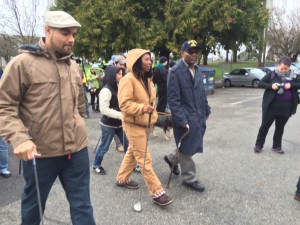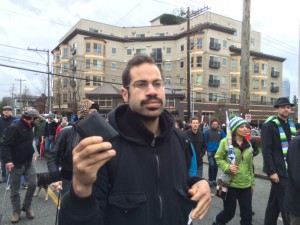
On Feb. 7, more than 100 spirited, multinational protesters took to the streets of Seattle’s Capitol Hill neighborhood carrying golf clubs and chanting, “Same story every time, walking while Black is not a crime!”
The protesters were demanding justice for William Wingate, a 70-year-old Air Force veteran and retired Metro bus driver. Wingate was arrested on July 9, 2014, while walking in Capitol Hill, carrying the golf club he usually used as a cane. Arresting officer Cynthia Whitlach claimed that Wingate was “brandishing” the club in a threatening manner. Wingate, who had never been arrested before in his life, spent the night in jail and agreed to a plea deal in which a misdemeanor weapons charge would be dropped after two years of “good behavior.”

However, friends in the community were concerned and contacted the city attorney, asking for an investigation. Dash-cam video contradicted Whitlach’s version of events. Adding to the community’s certainty that Wingate was being racially profiled, it was revealed that Whitlach had made racist remarks on Facebook in relation to events in Ferguson, Mo. After further investigation, the city dropped all charges on Sept. 19. Whitlach is now on “home duty” and under investigation for her remarks on social media.
The “Walking While Black with a Golf Club” march was a spirited affair. William Wingate, walking with a cane, led the marchers, most of whom carried golf clubs. “What do we want? Justice! When do we want it? Now” rang out, with golf clubs rising into the air to punctuate the chant on “justice” and “now.” Even a gusty rain, which started as the march reached the halfway point, could not dampen the enthusiasm of the mostly youthful marchers.
In attendance were two local activists who also recently suffered at the hands of the SPD. High school teacher and organizer Jesse Hagopian was pepper-sprayed by police on Martin Luther King, Jr. Day, as he simply walked past a line of cops at the downtown MLK Day rally while talking on his cell phone. Mohawk Kuzma was arrested on MLK Day as part of a civil-disobedience action that took over Highway 99. Police cut the straps of his backpack and failed to return his wallet—which contained his ID and Orca transit card—after he was released. Kuzma repeatedly requested the return of his wallet and was given the runaround until, through his activism on Twitter, he created a public embarrassment for the SPD. The top brass and their Public Relations flack then managed to locate the missing wallet and also presented him with a replacement backpack for the one the cops had ruined.
These events took place in the context of the Seattle Police Department’s investigation and sanction by the U.S. Department of Justice. In December 2011, the SPD was investigated by the DOJ, which found that officers had violated the Constitution and federal law and engaged in a pattern of excessive use of force. The department has openly resisted the changes required by the DOJ; in 2014, Kathleen O’Toole became the latest police chief, ostensibly with the mission to clean up the department and bring it into compliance.
Efforts to make the SPD comply with the DOJ’s mandated changes are portrayed in the media with one of two narratives. One narrative is that of a police department plagued with an unusually large number of “bad apples” or “rogue officers”; alternately, the story is one of a departmental “culture” of impunity and racism that needs to be reshaped through improved training and new procedures.
What both these narratives fail to address is the essential role of the cops in society at large. Whether or not officers personally hold racist beliefs or violate departmental policies on use of force, the police are a special body of armed men and women who act to protect the interests of the capitalist ruling class. No amount of PR or public apologies can change this.
Right now, the leadership of the SPD is on the defensive. The so-called bad apples continue to misbehave in particularly egregious ways, even when it would be more politically expedient for them to play it cool. The department’s disarray makes this the perfect time for the movement for police accountability to go on the offensive and push for genuine community control of the police.






